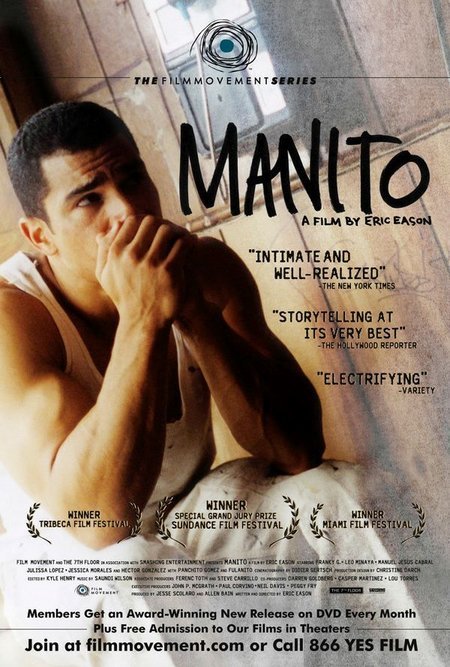
MANITO
(director/writer: Eric Eason; cinematographer: Didier Gertsch; editor: Kyle Henry; music: Saundi Wilson; cast: Franky G. (Junior Moreno), Leo Minaya (Manny “Manito” Moreno), Manuel Cabral (Oscar Moreno), Julissa López (Miriam, sister-in-law), Jessica Morales (Marisol), Hector González (Abuelo, grandfather), Panchito Gómez (Rodchenko, Mexican worker), the band Fulanito (themselves), Jay Dog (Mugger #1), Gilly Delgado (Mugger #2); Runtime: 74; MPAA Rating: NR; producers: Jesse Scolaro/Allen Bain; Film Movement; 2002)
“First-time director Eric Eason’s assured debut feature is a gritty urban drama shot on a shaky handheld DV camera for $25,000.”
Reviewed by Dennis Schwartz
First-time director Eric Eason’s assured debut feature is a gritty urban drama shot on a shaky handheld DV camera for $25,000. It has the authentic look, feel and salsa sounds of big city street life, capturing in a documentary fashion the tough street scenes, ethnic divide and tensions among the Latinos in the mostly Dominican Upper Manhattan neighborhood of Washington Heights–known at one time as the crack cocaine capital of the world. The mostly non-professional actors bolstered by the film’s charismatic star Franky G. (“Confidence” and “The Italian Job”), do a superb job conveying the daily struggles needed for survival. The film traces one day in the life of a Latino family, who plan a big nightclub bash that night to celebrate the high school graduation of the easygoing Manny or as they call him Manito (Leo Minaya).
Junior Moreno (Franky G.) is a former drug dealer for his father Oscar (Manuel Cabral) and an ex-con who is now hustling as a painting contractor to support his loyal wife Miriam (Julissa López) and their young son, and is trying his best to stay legit even though he can’t help being a womanizer, a fast-talker and at times a volatile character. The muscular Junior is protective of his younger graduating from high school brother Manito, who earned a full academic scholarship to Syracuse and is looked upon with pride by the family and community as someone who can escape the bleakness of the impoverished and crime-ridden neighborhood. Ever since their heartless drug-dealer father, now an owner of a bodega, abandoned them, Junior has looked out for his brother and is paying for the club party. Manito resides with his dapper, low-key grandfather (Hector González), who sells lingerie to the local whorehouses.
The soft Manito invites to the bash his sexy street-smart classmate Marisol (Jessica Morales), who is a single mom, and is surprised she shows when she said she wouldn’t. At the party Manito’s friends and family speak highly of him, and he’s given a couple hundred dollars in gifts as a graduation present. When he escorts Marisol home by subway two vicious muggers assault them and rob him of his graduation dough. The kids retrieve the money and escape to her apartment thanks to her pepper spray, but Manito feels bad that he didn’t act manly and insists on leaving even though the muggers followed them home. For self-defense Marisol gives him a gun and when he’s jumped outside the building by the same muggers he shoots one in the head and is arrested.
The melodramatics and the characterizations were conventional, but what impresses most is the lingering after-effects of life set against a backdrop of racial hatred, street violence, dysfunctional families and police intimidation. It’s an ugly look at the second-generation immigrant’s American Dream to fit in and live a good life in a country known as the melting pot of the world, but it also shows in a cold unsentimental way just how tough it is to get away from the mean streets for those from the lower-class.
It won best prizes at the Sundance and Tribeca film festivals.
REVIEWED ON 6/25/2006 GRADE: A-